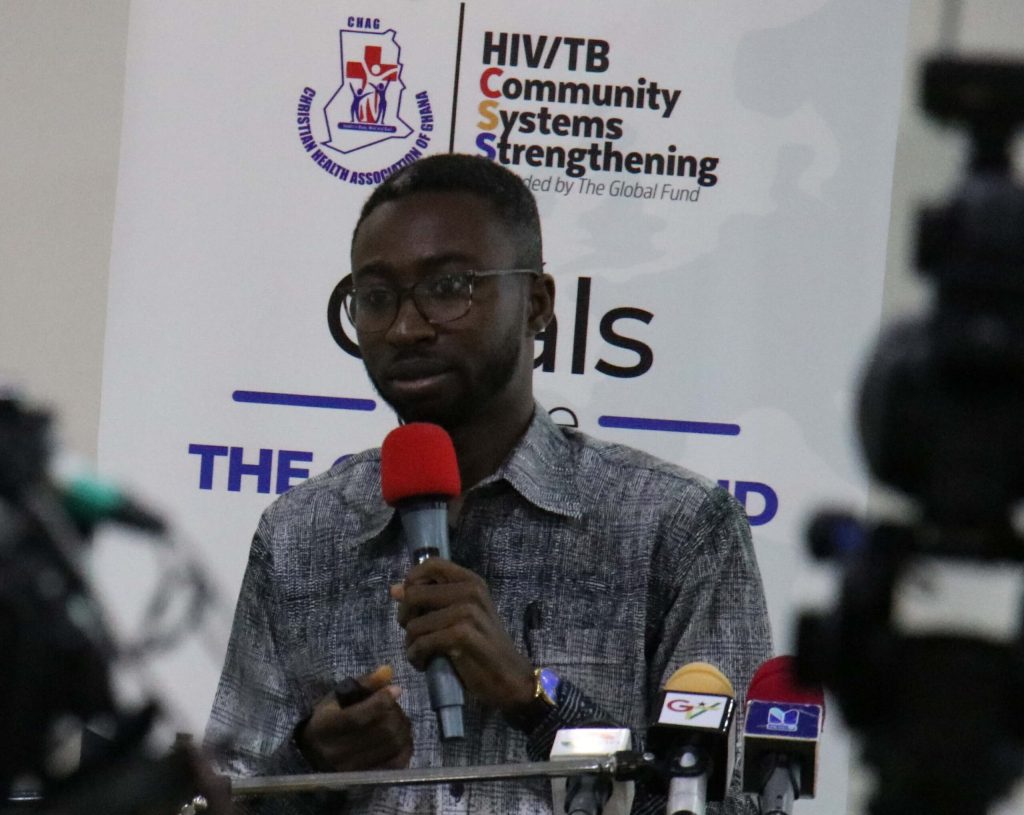A major component of the Community Systems Strengthening (CSS) intervention is addressing Human Rights issues that affect the community members, by instituting mechanisms that mitigate and reduce stigma and discrimination at the healthcare facilities and the community at large.
To this end, the Christian Health Association of Ghana engaged media personalities who will support stigma and discrimination campaigns in their respective media platforms on Friday, April 1, 2022 at the Crystal Palm Hotel, Tesano.
This engagement was an avenue to improve the knowledge of media persons who work in health-related programs/desks and those with keen interest in health-related reportage on the human rights of PLHIV/TB in order to help them to highlight and deliver targeted messages to their audience, while developing a shared responsibility in the quest to reduce stigma and discrimination.
Mrs. Cecilia Senoo, Founder and Executive Director of Hope for Future Generations (HFFG), Sub Recipient of the CSS grant in her welcome remarks emphasized the need for the media to sustain the partnership being created with them, and encouraged them to continue talking about the issues to be discussed, getting information, and responding objectively to matters arising.
“We expect that after this this discussion and engagement you will become one of the strongest partners of the Global Fund and the CSS under CHAG and ensure that the discussions will help us achieve the objectives of this meeting.”
Mr. Benjamin Cheabu, the Senior Program Manager of the CHAG-Global Fund CSS grant, gave an overview of the CSS intervention and the strategies being employed to achieve the set goals of the intervention.
He started by explaining the “Community” in CSS refers to persons living with and affected by HIV and TB.
“ARVs Work. Medications for HIV work. All the evidence suggest that indeed, it works.”
He made this remark while showing participants the global picture of HIV testing and treatment cascade. Antiretroviral drugs are a game changer as they help to virally suppress the virus in persons living with the disease.
The CSS intervention is implementing the provision of peer-led differentiated services which has persons living with HIV (PLHIV) volunteering to serve as mentors, supporters, and role models, to encourage other PLHIV to adhere to treatment by religiously taking their medication, and also offer them psychosocial support.
Mr. Cheabu mentioned that the intervention is also undertaking stigma and discrimination reduction training in twenty (20) health facilities, with community-led monitoring, advocacy, and feedback. Community peer paralegals, psychosocial counsellors, and pro bono lawyers have been engaged to offer support in this regard.
Mr. Cheabu said that stigma and discrimination prevents people from availing themselves for testing to know their status, or hide their status and not go for treatment. He entreated the media to amplify messages targeted at reducing stigma and discrimination.
Representatives from USAID and the CCM (Country Coordinating Mechanism), Dr. Devine Atubrah and Mr. Kenneth Yeboah, respectively, also gave solidarity remarks, and lauded the initiative of holding an engagement with the media. They pledged their continuous support to the implementation of the CSS intervention.
Mr. Jerry Amoah of the TB Voice Network Ghana (an Implementing Partner of the CSS grant) also addressed the media and implored them to help in the fight against stigma and discrimination against PLHIV/TB. He stated that TB is curable and yet people do not avail themselves for testing and treatment due to the stigma and discrimination that abounds in our society. He mentioned that the media has a great role to play in ensuring stigma is reduced in our communities.
Ms Elsie Aryeh, President of the National Network of Persons Living with HIV (NAP+) shared her story of living with HIV for the past 26 years. She remarked that PLHIV are not to be pitied.
“Thank God for treatment (ARVs), PLHIV are active, healthy and contributing positively to society.”
She mentioned that the engagement with the media is a good move and she sees the media as the conduit to inform the community that things are not as they used to be. Before treatment was made accessible, PLHIV had support groups who encouraged one another to face their fears and live in dignity. These support groups are now called “positive health and dignity groups”.
Three members from the CSS volunteer community (i.e. cadres) working to ensure PLHIV are reached out to, and linked to care so they continue to adhere to treatment, also shared their stories.
